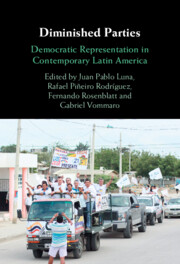Book contents
- Diminished Parties
- Diminished Parties
- Copyright page
- Contents
- Figures
- Tables
- Contributors
- Acknowledgments
- Abbreviations
- 1 Introduction
- 2 The Case of Uruguay’s Frente Amplio
- 3 Horizontal Coordination and Vertical Aggregation Mechanisms of the PRO in Argentina and Its Subnational Variations
- 4 Bolivia’s Movement toward Socialism: A Political Party Based on and Anchored in Social Movements
- 5 The Complex Interaction between Vertical Interest Aggregation and Horizontal Coordination: The PRD and MORENA in Mexico
- 6 PLN and PAC: Two Costa Rican Parties with Constituencies Evolving in Opposite Directions
- 7 The Case of the Traditional Parties in Paraguay
- 8 The Colombian Liberal Party and Conservative Party: From Political Parties to Diminished Subtypes
- 9 “Normal” Parties in Extraordinary Times: The Case of Primero Justicia and Voluntad Popular in Venezuela
- 10 Diminished by Design: Ecuador’s Alianza PAIS
- 11 The Chilean PPD: A Loose Confederation of Leaders
- 12 Fujimorismo and the Limits of Democratic Representation in Peru, 2006–2020
- 13 The Unidad Nacional de la Esperanza: Guatemala’s Only True Political Party?
- 14 Conclusions
- References
- Name Index
- Organization Index
- Subject Index
5 - The Complex Interaction between Vertical Interest Aggregation and Horizontal Coordination: The PRD and MORENA in Mexico
Published online by Cambridge University Press: 09 December 2021
- Diminished Parties
- Diminished Parties
- Copyright page
- Contents
- Figures
- Tables
- Contributors
- Acknowledgments
- Abbreviations
- 1 Introduction
- 2 The Case of Uruguay’s Frente Amplio
- 3 Horizontal Coordination and Vertical Aggregation Mechanisms of the PRO in Argentina and Its Subnational Variations
- 4 Bolivia’s Movement toward Socialism: A Political Party Based on and Anchored in Social Movements
- 5 The Complex Interaction between Vertical Interest Aggregation and Horizontal Coordination: The PRD and MORENA in Mexico
- 6 PLN and PAC: Two Costa Rican Parties with Constituencies Evolving in Opposite Directions
- 7 The Case of the Traditional Parties in Paraguay
- 8 The Colombian Liberal Party and Conservative Party: From Political Parties to Diminished Subtypes
- 9 “Normal” Parties in Extraordinary Times: The Case of Primero Justicia and Voluntad Popular in Venezuela
- 10 Diminished by Design: Ecuador’s Alianza PAIS
- 11 The Chilean PPD: A Loose Confederation of Leaders
- 12 Fujimorismo and the Limits of Democratic Representation in Peru, 2006–2020
- 13 The Unidad Nacional de la Esperanza: Guatemala’s Only True Political Party?
- 14 Conclusions
- References
- Name Index
- Organization Index
- Subject Index
Summary
During the last thirty years, Mexico saw two successful left-of-center political parties, the Partido de la Revolución Democrática (Party of the Democratic Revolution, PRD) and Movimiento de Regeneración Nacional (National Regeneration Movement, MORENA). The PRD was launched in 1989 and grew throughout the 1990s, becoming the second or third largest political force in the country. In 1997, the party won Mexico City’s mayoral post, which it retained until 2018. MORENA was officially born in 2014, in the midst of an internal PRD crisis, and quickly achieved electoral success, winning the presidency in 2018. The PRD and MORENA satisfy the definition of political party presented in the introduction to this volume, that is, a political organization that establishes horizontal coordination mechanisms among its leaders and vertically aggregates social interests. Moreover, the analytical model proposed by Luna et al. provides useful guidelines for studying the evolution of parties of the Mexican Left. In particular, this chapter highlights the heuristic value of analyzing the impact of the interaction between horizontal coordination and vertical interest aggregation. The case of Mexico illustrates that taking into account how parties connect with their environment helps explain the stability (or instability) of the party.
Keywords
Information
- Type
- Chapter
- Information
- Diminished PartiesDemocratic Representation in Contemporary Latin America, pp. 93 - 110Publisher: Cambridge University PressPrint publication year: 2021
